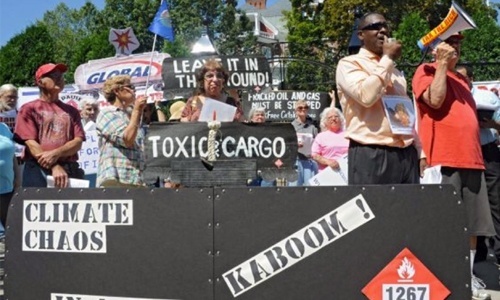
Victory for Groups Fighting Proposed Tar Sands Facility as Full Environmental Review Now Required

Read page 1
“This is wonderful and welcome news for the people of Albany,” said Chris Amato, Earthjustice attorney. “We are gratified that DEC has listened to the community’s concerns and agrees with us that Global’s proposal will have significant environmental impacts. We look forward to working with the Department to identify the multitude of threats to the health and safety of communities that make this project a disaster-in-waiting.”
However, in the past week the expected outcome was not that the DEC would arrive at the conclusion they did. Capital New York reported that the DEC had been making the rounds of local politicians and informing them that it would be “legally difficult” for them to not allow Global to go forward with their plans for building a facility for heating tar sands crude.
So what changed the expected outcome? One significant development was a letter from the Environmental Protection Agency (EPA) to theDEC commissioner Joe Martens making two points.
The first was reminding Martens that he had not responded to a letter sent by the EPA a year ago asking for more information about the proposed project and pointing out flaws in the DEC’s air pollution analysis.
The second was to let Martens know that the EPA wanted to see any proposed permit to allow Global’s heating facility prior to the official review period so that the EPA could work “corroboratively with DEC to ensure that outstanding permitting issues concerning Global are addressed.”
While oil will still be transported to Albany by rail and then down the Hudson by barge and tanker, for now it is likely to remain the Bakken oil and not Canadian tar sands — which avoids the disaster that tar sands spills create in water.
This is welcome news in Albany and in communities all along the Hudson due to the risks involved.
NorthJersey.com recently reported on the risks posed by moving oil on the Hudson and spoke about these risks to retired Texas A&M University oceanography professor and expert on oil spills, Chuck Kennicutt.
“I have no side in this issue, but I do know one thing: You will have a spill,” said Chuck Kennicutt. “It’s almost inevitable. The question is how big.”
At least for now, thanks to the efforts of a large coalition of groups in New York, if that spill does occur, it won’t be Canadian tar sands oil.
YOU MIGHT ALSO LIKE
Robert F. Kennedy, Jr. Joins Farmers and Ranchers to Call on Gov. Brown to Reject LNG Exports

 233k
233k  41k
41k  Subscribe
Subscribe 
